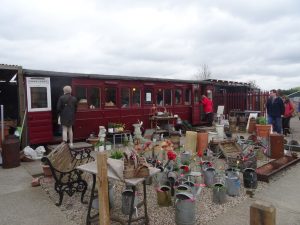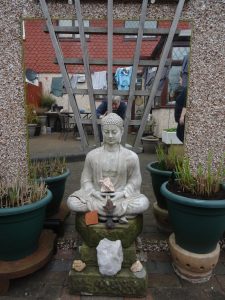After words (https://angelajeffs.co.uk/whats-in-a-word/), things. But what do I mean by things?

An open antique market in Essex, where things include a vintage train carriage, garden furniture and great skyscapes. But is sky – the sky – a thing?
A few weeks ago, nearing the completion of a book I had been working on since New Year, I was on call in my local charity shop. As usual, I checked the book shelves, and once again a title jumped out at me: A.C Grayling’s The Meaning of Things.
It was the word ‘things’ that caught my eye. Because my own book is also essentially about things. But as I was to discover, one person’s idea of things is not necessarily the same as another’s definition and understanding of the word. (Or maybe it’s even more complicated than that.)
Household Stories/ Katei Monogatari is about a house, and the things (with all their associated tales) that our house in Japan contains, or rather contained. (We left in late 2012 to move here.) So a book largely about material objects that could be regarded as relatively unimportant: possessions, furniture, books, plants, etc.
Grayling’s book (Applying Philosophy to Life) is about how life is enriched by things that ‘matter’: “values, aims, society, the characteristic vicissitudes of the human condition, desiderata” (Latin, desired things) “both personal and public, the enemies of human flourishing, and the meanings of life.” (An impressive paragraph in itself.)
Always interested in how a book is constructed, he offers short essays under three main headings (as in three parts): Virtues and Attributes, Foes and Fallacies, and Amenities and Goods.
It was under this final heading that I found writings most relevant to Household Stories: Art. Leisure. Peace. Reading. Memory. History. Travel. Privacy. Family. Age. Gifts. Trifles.
I suppose this is because HHS (as it has been headed in my documents file since 2011, when I completed the first draft) describes a fair amount of art, quite a few gifts, and to what a reader may appear to be any number of trifles.
And here I have to laugh. Because compared to a book on philosophy, I suppose my book is trifling in its concerns.
But that is for the reader to decide, and those concerned in its production have found it quite the opposite. So I am comforted.
Yes, HHS is a book about things. But it is also a physical and spiritual journey through time and space to the point of accepting the relative unimportance of physical things. Which leaves us with the spiritual, which is of course what Grayling’s book is mostly about.
But wait. While the Foes and fallacies of Part 2 initially left me cool to cold, I do now find Faith, Miracles, Prophecy and Paganism more than a little interesting. And some of the Virtues and Attributes of Part 1 move to warm the cockles of my heart, because HHS is also about Love, Happiness, Hope, Courage, Sorrow, Tolerance, Civility, Perseverance … so much more than mere ‘trifles’.

Lee and Sue’s garden in Basildon, Essex. Also full of things: plants in pots, mirrored washing on the line, and Buddha. A statue of Buddha is a thing for sure, but Buddha himself?
Now I am not only comforted. I am encouraged.
By the time I next blog, Household Stories/ Katei Monogatari will be available via Amazon.com. So expect an enthusiastic and 100% unashamed sell.

